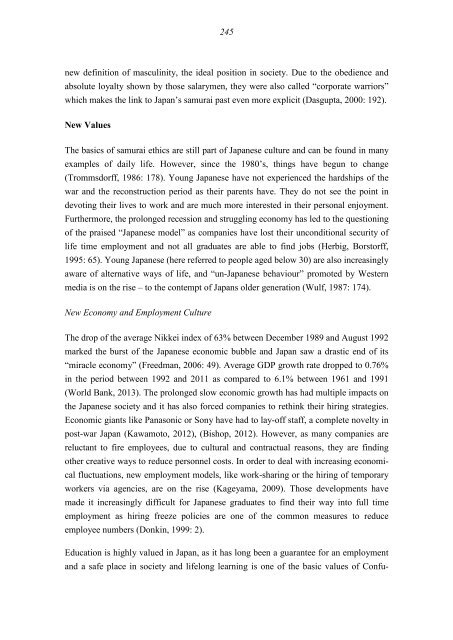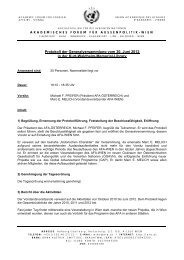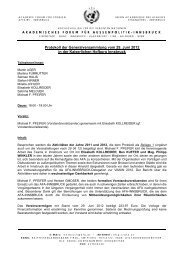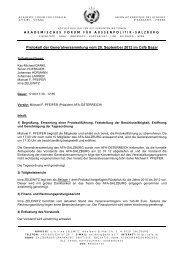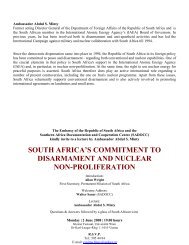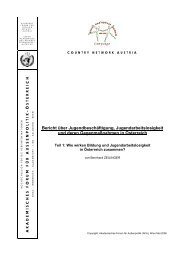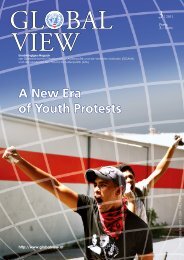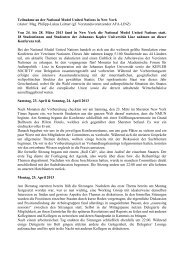GAP-JOURNAL 2012/13 - AFA
GAP-JOURNAL 2012/13 - AFA
GAP-JOURNAL 2012/13 - AFA
Erfolgreiche ePaper selbst erstellen
Machen Sie aus Ihren PDF Publikationen ein blätterbares Flipbook mit unserer einzigartigen Google optimierten e-Paper Software.
245<br />
new definition ofmasculinity, the ideal position insociety. Due to the obedience and<br />
absolute loyalty shown bythose salarymen, they were also called “corporate warriors”<br />
which makes thelink toJapan’s samurai past even moreexplicit (Dasgupta, 2000: 192).<br />
New Values<br />
The basics of samurai ethics are still part of Japanese culture and can be found in many<br />
examples of daily life. However, since the 1980’s, things have begun to change<br />
(Trommsdorff, 1986: 178). Young Japanese have not experienced the hardships of the<br />
war and the reconstruction period as their parents have. They donot see the point in<br />
devoting their lives to work and are much more interested intheir personal enjoyment.<br />
Furthermore, the prolonged recession and struggling economyhas led tothe questioning<br />
of the praised “Japanese model” as companies have lost their unconditional security of<br />
life time employment and not all graduates are able to find jobs (Herbig, Borstorff,<br />
1995: 65). Young Japanese (herereferred to peopleaged below 30) are also increasingly<br />
aware ofalternative ways oflife, and “un-Japanese behaviour” promoted byWestern<br />
mediaisonthe rise –tothe contempt of Japans older generation (Wulf, 1987: 174).<br />
New Economyand Employment Culture<br />
The drop of the average Nikkei index of63% between December1989 and August 1992<br />
marked the burst of the Japanese economic bubble and Japan saw adrastic end ofits<br />
“miracle economy” (Freedman, 2006: 49). Average GDP growth rate dropped to 0.76%<br />
in the period between 1992 and 2011 as compared to 6.1% between 1961 and 1991<br />
(World Bank, 20<strong>13</strong>). The prolonged slow economic growth has had multiple impacts on<br />
the Japanese society and ithas also forced companies torethink their hiring strategies.<br />
Economic giants like Panasonic orSony have had to lay-off staff, acomplete novelty in<br />
post-war Japan (Kawamoto, <strong>2012</strong>), (Bishop, <strong>2012</strong>). However, as many companies are<br />
reluctant to fire employees, due to cultural and contractual reasons, they are finding<br />
other creative ways toreduce personnel costs. In order todeal with increasing economical<br />
fluctuations, new employment models, like work-sharing or the hiring oftemporary<br />
workers via agencies, are onthe rise (Kageyama, 2009). Those developments have<br />
made it increasingly difficult for Japanese graduates tofind their way into full time<br />
employment as hiring freeze policies are one of the common measures to reduce<br />
employee numbers (Donkin, 1999: 2).<br />
Education ishighly valued inJapan, asithas long been aguarantee for anemployment<br />
and asafe place in society and lifelong learning isone of the basic values of Confu-


